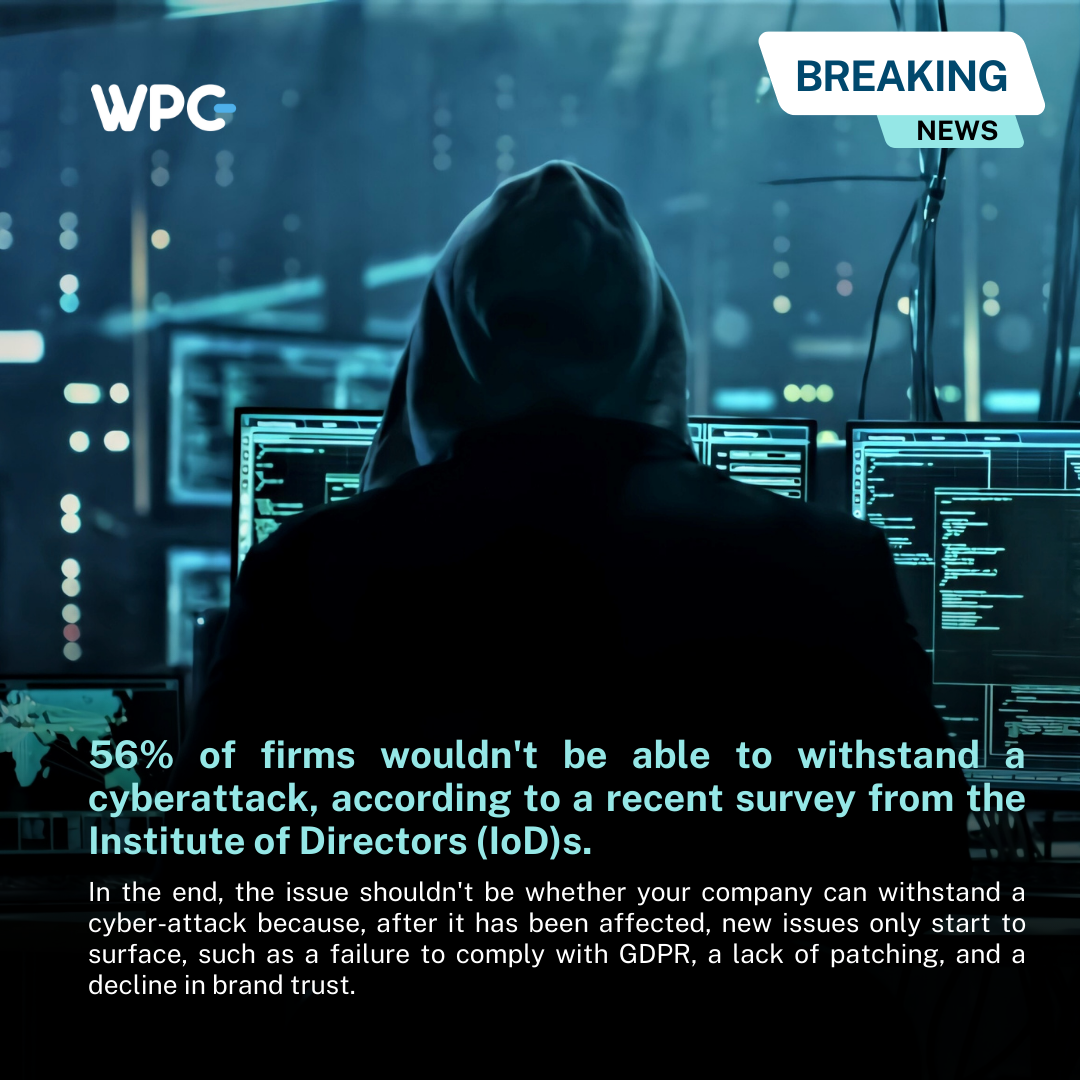Since there has been an enormous rise in cyberattacks in recent years, it is now a matter of when your organization (no matter the size) will be the target of one.
56% of firms wouldn’t be able to withstand a cyberattack, according to a recent survey from the Institute of Directors (IoD) and Barclay’s, demonstrating the seriousness of the threat and how frequently a business may be destroyed. In the end, the issue shouldn’t be whether your company can withstand a cyber-attack because, after it has been affected, new issues only start to surface, such as a failure to comply with GDPR, a lack of patching, and a decline in brand trust.
Is all of this worth not having a comprehensive cyber-security policy in place?
Cybercriminals will already be aware of your vulnerability, so what’s to stop them from attacking you again? Cyberattackers are similar to bullies in that just because they have attacked you once doesn’t imply that that’s the end of it. They will continue to hit you until you take action.
What You Need to Know About Cyberattacks
A planned attack performed from one system against another, a collection of computers, or a network is known as a cyberattack.
There are typically two basic categories of cyber attacks. One involves taking the intended target offline, while the other involves entering the system to gain access to useful data.
The second type of attack is more frequent for the majority of small firms. This is particularly true if your business maintains sensitive data like social security numbers, credit card or banking details, salary information, or health records.
In that situation, a hacker might choose to attack your network in an effort to obtain, for example, the credit card numbers of your clients so they can utilize them to make transactions.
In the event that something similar occurs, it causes a significant hassle for your consumers and damages the reputation of your company.
How Do You Prepare For a Cyberattack?
Although you can’t shield your company from every threat, you can plan ahead and have a backup in case something does go wrong.
A government assessment has revealed that 70% of the UK’s top company owners have not been trained on how to react to a cyber-attack. The analysis also finds that 10% of the top 350 companies in Britain operate without a cyber response plan after being attacked, despite the fact that half of those polled said that cyber security is one of the biggest risks to their companies. Today’s society is making it increasingly clear that companies need to start being more proactive about cyber security.
The Repercussions Of a Cyberattack
Every cybercrime and data breach costs your small business money. They are expensive to look into and address – and your company will suffer reputational damage and missed time. In addition, prices charged by insurers to protect themselves from cybercrime have risen, making it prohibitively expensive for many small businesses to purchase insurance to cover cybercrime. Even years after the first data breach, the negative reputation and financial impact of a hack can hurt your company. A small business is far less equipped to withstand this expense, which has climbed by 10% over the last five years, even though a cyberattack can cost a major corporation more in terms of actual money lost. The cost increases with the length of time it takes to find and identify the breach.
Protect Your Business From a Cyberattack
You can begin taking action to safeguard important information now that you are aware of how simple it is for data to be stolen.
Also, keep in mind that you should include any remote workers or employees who occasionally work from home in these regulations.
Examine your software.
Checking to see if your operating system and software are up to date is a simple first step. Because they’ve found a way in, hackers frequently have access to outdated systems.
Establish a program that scans for any system or software upgrades and executes them as per business policy.
Train your staff
Your staff is typically your primary line of protection against cyberattacks. Include some cybersecurity training in your onboarding process and employee handbook, as well as having annual cybersecurity conversations.
Additionally, it’s a good idea to suggest that staff members use secure passwords and have their passwords changed frequently. Strong passwords may be created and kept secure using programs like LastPass and 1Password.
Remember emails too. Hackers will create emails that appear to be legitimate and request personal information or file downloads from the recipients, giving them access to the system. “Phishing” is the term for this.
Always backup!
Making regular backups of all your files and data is a useful additional protective measure. Many firms will perform a weekly data backup, therefore this is an excellent procedure to implement.
You won’t have to fear that all your data will be lost in the event of a security breach this way. And you may utilize that data to determine what information got taken.
What If You Get Hacked?
Here are some things you could do if you get hacked:
- Immediately update all system passwords
- Determine the point of entry the hacker used to breach the system
- Check all of your systems for viruses or malware.
- If consumers are affected, contact them.
Contact a cybersecurity firm that can assist you with the process if the incident is out of your control!
Cybersecurity Advice From The Government
According to Matt Hancock, the UK’s Minister for Digital, “Recent cyber-attacks have demonstrated the disastrous repercussions of failing to adopt the proper approach to cyber security. According to reports, there is still a long way to go until all of our organizations adopt best practices, so I implore all senior executives to collaborate with the National Cyber Security Centre and follow the government’s training and advice.
According to the Director General of the IoD, Stephen Martin, “Our analysis has found that business leaders are still putting cyber security on the back burner. The results, even for small and medium-sized firms, could be disastrous.”
The IoD has suggested that businesses employ the bare minimum security measures listed below to become cyber-secure:
- Put in place official programs for staff workers to learn about cybersecurity
- Intensify director training
- Run more simulation exercises to determine how their business would respond to a real cyberattack
How Can Workplace Connect Help?
Any business owner’s top priority is to safeguard their enterprise. Therefore, even if there is little chance of an attack, creating a cybersecurity plan is crucial.
Workplace Connect has a solid team of security specialists who are prepared to offer advice on the best ways to protect your IT infrastructure and who are aware of how simple it is to attack it.
Workplace Connect may provide a variety of choices to outsource your security through our cybersecurity services, allowing professionals to ensure that you adopt a proactive strategy toward cybercrime.
We also provide security awareness training, emphasizing the significance of cybercrime and how people may stop it by simulating actual attacks.
Workplace Connect can assist you with achieving Cyber Essentials accreditation, a Government-backed program that is largely regarded as providing good, fundamental security for any company operating in the UK, provided you are eager to heed the government’s advice.







